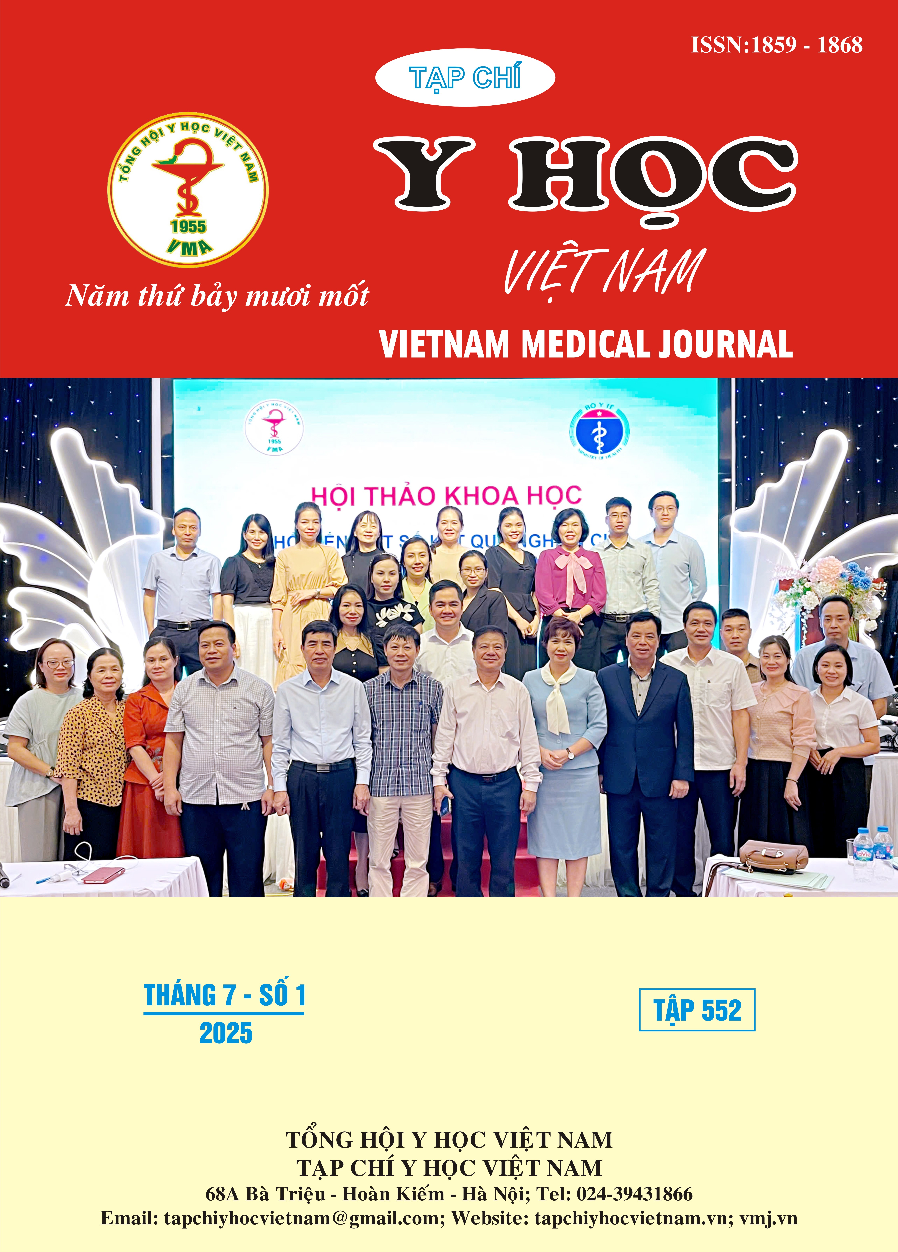BƯỚC ĐẦU ĐÁNH GIÁ GIÁ TRỊ CỦA THANG ĐIỂM NGUY CƠ ĐA GEN CHO BỆNH ĐỘNG MẠCH VÀNH TẠI BỆNH VIỆN THỐNG NHẤT
Nội dung chính của bài viết
Tóm tắt
Đặt vấn đề: Hiện nay, bên cạnh các thang điểm nguy cơ truyền thống, thang điểm nguy cơ đa gen đã được khuyến cáo sử dụng để đánh giá nguy cơ mắc bệnh động mạch vành. Tuy nhiên, chưa có dữ liệu của thang điểm này trên người Việt Nam. Do đó, chúng tôi thực hiện nghiên cứu này nhằm bước đầu phân tích giá trị dự đoán nguy cơ bệnh động mạch vành từ thang điểm nguy cơ đa gen. Đối tượng và phương pháp nghiên cứu: Nghiên cứu quan sát trên bệnh nhân Việt Nam được khảo sát động mạch vành xâm lấn và được phân tích thang điểm nguy cơ đa gen cho bệnh động mạch vành tại Bệnh viện Thống Nhất. Nguy cơ bệnh động mạch vành được chia làm 3 mức là trung bình, trung bình–cao và cao. Kết quả: Từ 04/2023 đến 04/2025, nghiên cứu đã thu thập được 30 bệnh nhân (tuổi trung bình là 63±17,5; thấp nhất: 30 tuổi, cao nhất: 104 tuổi). Tỉ lệ mức nguy cơ bệnh động mạch vành dựa trên thang điểm nguy cơ đa gen là 73,4% (n=22) cho mức trung bình, 13,3% (n=4) cho mức trung bình–cao và 13,3% (n=4) cho mức cao. Tất cả bệnh nhân có nguy cơ trung bình–cao và cao đều có bệnh động mạch vành 3 nhánh. Có 12/22 bệnh nhân nhóm nguy cơ trung bình có bệnh động mạch vành và tất cả 12 bệnh nhân này đều có các yếu tố nguy cơ khác của bệnh động mạch vành. Kết luận: Nghiên cứu bước đầu ghi nhận thang điểm nguy cơ đa gen có giá trị trong đánh giá nguy cơ bệnh động mạch vành cho người Việt Nam. Cần có nghiên cứu với cỡ mẫu lớn hơn nhằm xác định giá trị của thang điểm này tại Việt Nam.
Chi tiết bài viết
Từ khóa
thang điểm nguy cơ đa gen, bệnh động mạch vành, người Việt Nam
Tài liệu tham khảo
2. Aragam KG, Dobbyn A, Judy R, Chaffin M, Chaudhary K, Hindy G, Cagan A, Finneran P, Weng LC, Loos RJF et al: Limitations of Contemporary Guidelines for Managing Patients at High Genetic Risk of Coronary Artery Disease. J Am Coll Cardiol 2020, 75(22):2769-2780.
3. Marston NA, Pirruccello JP, Melloni GEM, Koyama S, Kamanu FK, Weng LC, Roselli C, Kamatani Y, Komuro I, Aragam KG et al: Predictive Utility of a Coronary Artery Disease Polygenic Risk Score in Primary Prevention. JAMA Cardiol 2023, 8(2):130-137.
4. Damask A, Steg PG, Schwartz GG, Szarek M, Hagstrom E, Badimon L, Chapman MJ, Boileau C, Tsimikas S, Ginsberg HN et al: Patients With High Genome-Wide Polygenic Risk Scores for Coronary Artery Disease May Receive Greater Clinical Benefit From Alirocumab Treatment in the ODYSSEY OUTCOMES Trial. Circulation 2020, 141(8):624-636.
5. Vrints C, Andreotti F, Koskinas KC, Rossello X, Adamo M, Ainslie J, Banning AP, Budaj A, Buechel RR, Chiariello GA et al: 2024 ESC Guidelines for the management of chronic coronary syndromes. Eur Heart J 2024, 45(36):3415-3537.
6. O'Sullivan JW, Raghavan S, Marquez-Luna C, Luzum JA, Damrauer SM, Ashley EA, O'Donnell CJ, Willer CJ, Natarajan P, American Heart Association Council on G et al: Polygenic Risk Scores for Cardiovascular Disease: A Scientific Statement From the American Heart Association. Circulation 2022, 146(8):e93-e118.
7. Schunkert H, Di Angelantonio E, Inouye M, Patel RS, Ripatti S, Widen E, Sanderson SC, Kaski JP, McEvoy JW, Vardas P et al: Clinical utility and implementation of polygenic risk scores for predicting cardiovascular disease. Eur Heart J 2025, 46(15):1372-1383.
8. Aragam KG, Natarajan P: Polygenic Scores to Assess Atherosclerotic Cardiovascular Disease Risk: Clinical Perspectives and Basic Implications. Circ Res 2020, 126(9):1159-1177.


